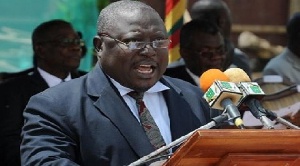 Martin Amidu, Former Attorney General
Martin Amidu, Former Attorney General
Former Attorney General Martin A.B.K. Amidu has claimed some influential people and chiefs are trying to persuade new President Nana Addo Dankwa Akufo-Addo not to prosecute perceived corrupt officials under the previous Mahama administration.
He said President Akufo-Addo’s anti-corruption efforts would be meaningless if he takes the path of reconciliation instead of probity and accountability.
In a statement released recently, Mr. Amidu, who is a member of the NDC and renowned for his anti-corruption exploits, said “I assure every Ghanaian that the evidence of criminal and unconstitutional conduct is overwhelming, but unconstitutional attempts are being made through influential chiefs and elders to let bygones be bygones contrary to the demands of the Constitution for accountability, transparency and fairness in governance.”
He accused the 6th Parliament of the 4th Republic of assisting the previous Mahama administration to loot the country and hoped that the current 7th Parliament will not attempt to “compromise the President’s anti-corruption agenda in the name of reconciliation.”
“The President’s anti-corruption drive will be still-born with such compromises and reconciliations.”
While congratulating the new Speaker Prof. Mike Aaron Oqcuaye, the former AG said “unlike previous elections in the annals of our history the pivotal and critical issues were between electing a corrupt, bankrupt, inept, incompetent, abusive, impudent, and Looter incumbent Government, and electing one of the contesting candidates dedicated to fighting all these unconstitutional capricious evils and protecting the national purse.”
He prayed that Ghana should never elect a President like John Mahama because he is corrupt and had looted the country’s treasury.
“The massive thrashing of the incumbent Looter Government of John Dramani Mahama (may God never give Ghana a corrupt and looter President like him again) by the President Nana Akufo-Addo and the New Patriotic Party (NPP) is a clear expression of the sovereign will of Ghanaians for accountability, transparency and fairness in governance to all citizens without fear or favour.”
He said Ghanaians voted against what he termed “patronage, cronyism, ethnicity, and political party cryptocracy,” saying “Ghanaians, therefore, expect and demand a total brake with the immediate past practices of the parliaments which were reduced into appendages of the executive chariot in looting the national purse.”
“Ghanaians have demanded and expect that the mandate of the 7th Parliament will be consistent with the letter and spirit of the 1992 Constitution; and the promises by the President to protect the national purse and be impartial in the governance of our dear country.”
“The promises of the President upon whose steam of anti-corruption agenda the NPP in Parliament had such a beautiful majority, meets Citizens Vigilance for Justice’s agenda of putting Ghana First,” adding “I dare say that the reasonable number of members of Parliament returned and voted to the 7th Parliament was the result of the electorate’s perception of their ability to put Ghana First in holding the executive to account.”
He said that “the expectations of Ghanaians that the President and the 7th Parliament would for the first time since 2009 indeed render selfless service to the people of Ghana and not champion their corrupt self-interest and their political party’s myopic corrupt self-interest was demonstrated by the events that unfolded on Friday, 6th January 2017 at the concluding deliberations of the Sixth Parliament under the Fourth Republican Constitution, 1992.”
Mr. Amidu said that “the partisanship, cronyism, patronage, ethnicity, and endemic corruption of the Looter Governments of the Fifth and Sixth Governments of the Fourth Republic had been allowed by the majority to infect the fabric and conduct of Legislative business in the House.”
He hoped the current parliament would “be a leading champion of the anti-corruption agenda within itself and against the executive and judiciary,” adding “may this 7th Parliament not be party to paid covert Government surveillance through illegal undercover agents spying on coordinate organs of government and collaborating with the executive to suppress parliament’s own corrupt practices while exposing that of the least powerful branch, the judiciary.